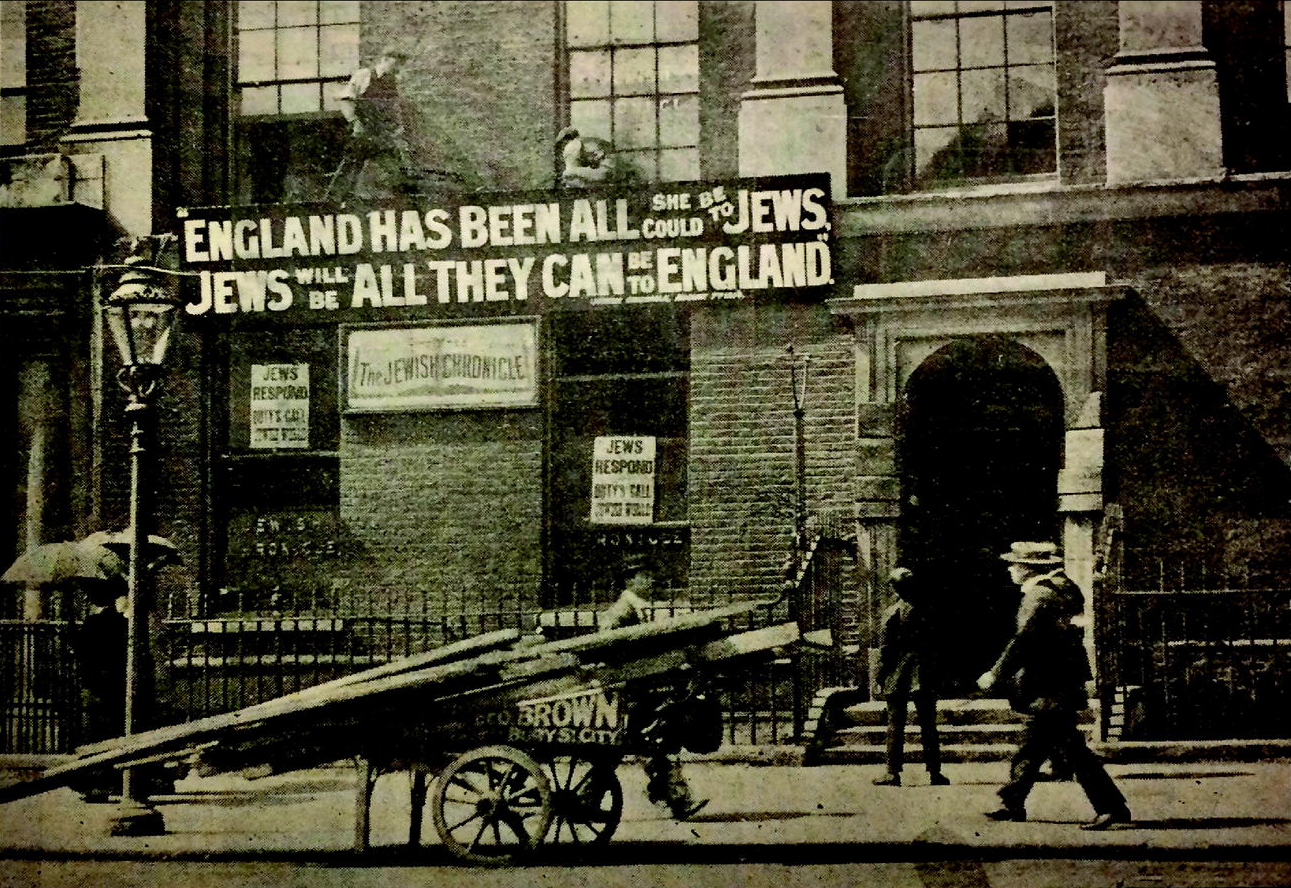Editor’s note: The following comprises the fifteenth chapter of The Jews, by Hilaire Belloc (published 1922).
(Continued from Chapter 14: Various Theories)
CHAPTER XV: HABIT OR LAW?
If it be true that the friction between the Jew and the civilization in which he lives is aggravated by his habit of secrecy and by our disingenuousness, by his expression of a sense of superiority which galls us, and on our side by a lack of charity and of intelligence in dealing with him, it would follow that no solution can be more than approximate: that whatever arrangement be come to the contrast will remain, and with it a certain latent friction, which always accompanies contrast.
But there is between a simmering of that kind and the active boiling of the question today (with the threat of its boiling over) all the difference in the world. But even though the solution be imperfect, it might be reasonably stable: we might at least have peace, though not friendship. It further follows from the elements of the problem that the solution lies along the lines of either party modifying whatever in its action is an irritant to the other; whatever, that is, can be modified by the will, and is not mixed up with something ineradicable.
The Jew cannot help feeling superior, but he can help the expression of that superiority—at any rate he can modify such expression. He can certainly, though it be at a great expense of tradition and habit, get rid of that pestilent pseudo-defence of secrecy which poisons all the relations between him and ourselves. We on our side can drop what is the converse of that secrecy, the disingenuousness, the lack of candour, into which we are fallen in our relations with the Jew. That cannot but mean a great breach with our tradition and with habit also, but the advantage is worth the sacrifice. We can (it must be the work of each individual, it cannot be a corporate work) approach the Jew with more respect and yet with more frequency. We can, I think, advance by many degrees from the lack of charity we now show, even if we despair of living in real intimacy with a people so different in their deepest qualities from ourselves.
Personally, I am not sure that such closer intimacy might not be established; I have never found any difficulty in reaching and retaining intimate acquaintance with the Jews of my own circle—but I may have been fortunate. I know that with most of my fellows it is not so, and perhaps the Jew will always remain to the mass of those about him something strange and unapproachable, and I fear, repulsive. But there is no reason, why we should mix with that hesitation in our relations an element of indifference, still less of contempt, still less, again, of cruelty.
I repeat the formula for a solution: it is recognition and respect.
Recognition is here no more than the telling of the truth: there is a Jewish nation. Jews are citizens of that nation; and recognition means not only the telling of this truth on special occasions but the use of it as a regular habit in our relations on both sides.
This statement is, upon any just analysis of the Jewish question, so obvious and so simple, that it needs neither insistence upon it nor development. Its plain statement is sufficient. But there attaches to a solution so determined a much more active and complicated question, upon the uncertainty of which not only this reform but many another has made shipwreck. The question must be answered rightly, because, if we answer it wrongly, the whole scheme fails.
The question is this: Should the social habit, the general method in writing and speaking and in all relations, precede in this case the institutional action, legal changes, constitutional definitions? Or should the legal changes, the new institutions, the constitutional definitions come first?
To decide rightly is of great moment, for this reason, that a wrong decision may destroy all the effect of goodwill.
In my judgment the wrong decision would be that which would give precedence to legal change, to new definitions, to new institutions, and attempt out of them to build a new spirit. I take it that this reversal of the true order would make all stable peace impossible.
It must be admitted, of course, that changes suggested by the Jews themselves, the development of their own institutions, a voluntary segregation of their community in other fields than those in which they have already effected that segregation, stand in another category. These new and definitely Jewish institutions we should always welcome. But the attempt at framing public regulations, which are to defend the community as a whole against an alien minority, when that minority must live with one permanently and as a regular feature of the life of the community, invariably tends to oppression, if such regulations are made the first steps in a settlement instead of being left, as they should be, to the last. Any separatist legislation should arise naturally out of a long practice and full recognition of the Jews as a separate people and of the accompaniment of that recognition with respect. If the advance is made on our side, the Jew may refuse any such bargain. He may dig his heels in and insist, as many another privileged class has insisted before him, that he will continue to enjoy all that he has ever enjoyed, that he will continue his demand for a dual allegiance, that he will insist on the very fullest recognition as a Jew, and at the same time on what is fatal to such recognition, the fullest recognition as a member of our own community.
If he does that (and there are those who tell us he will certainly do so, and will refuse all reform), then the community will be compelled to legislate in spite of him. It will be perilous for him and for us; it may even be the beginning of grievous trouble for both, but it will be inevitable. It will appear in a mass of legislation all over Europe, which will affect this country with the rest.
The present situation cannot last indefinitely. It is already uncertain even here, in England; it has reached further stages on the road to ruin elsewhere. But if the Jew sees the peril in time, and appreciates the nature of that change, the beginnings of which we have all seen and which is proceeding at so great a pace, then relations can be established out of which (later) formal rules, acceptable to both parties, should proceed. And in that case it would be, I repeat, the gravest of errors to initiate new positive laws and a new status before a foundation had been prepared by the re-establishment of honest relations; and that can only be done by a frank admission of reality, by the open and continual admission everywhere that Israel is a nation apart, is not, and cannot be, of us, and shall not be confounded with ourselves.
There is great temptation to delay, because the acuteness of the problem is not felt here as yet, among the well-to-do, and still more because it differs in different communities. The peril seems still far distant from us, though it may be at the very door of our neighbours. Routine, the inheritance of the immediate past, the false security produced by the conventions of that past, may well tempt those who dislike the effort of a change to shirk that change. But I would ask any intelligent and thoughtful Jew who still thinks he can rely upon the false position of the nineteenth century whether the same forces are there to support him to-day as were present then?
Take a particular example. In Poland and in Roumania the old fiction has been temporarily imposed by force. The Jew, who in both these countries is felt to be more alien than any other foreign European could be, is imposed upon the Government and society of each country by the Western Governments as a full citizen. The strain here is immensely aggravated because it arose not from the nature of society but from the action of outsiders; the English, the French, the American Governments (but particularly the American and the English) have erected in Eastern Europe this unstable, unjust and artificial state of affairs. It cannot last, for it is unreal.
The communities in question may make no laws which recognize the Jew; alternatively, the door is open for oppression: and the moment the hated foreign interference weakens, oppression will come.
Well, when under the pressure of a real social difficulty and a crucial one, the unreal settlement is torn up, by the passing of new laws recognizing the Jew (but harshly, and under no agreement with him) or by actual hostility, does the Jew in his heart of hearts think that he would have the same support from the West now as he would have had thirty years ago? He knows very well he would not.
Thirty years ago you would have got from all the traditional Liberalism of France, from the great bulk of its governing class and the whole of its academic organization, from what was then the solid and still respected body of old Republicans, an immediate answer to the Jewish appeal. In England that answer would have been unanimous and enthusiastic. You would have had torrents of leading articles, great public meetings, Cabinet Ministers speechifying all over the place in the sacred cause of toleration. Every one knows that to-day the appeal of the Eastern Jews, though it might still be supported officially, would be received by the public with indifference. Ten years hence it may be received with derision.
Or take another example. Let us suppose—it is highly probable—that the Zionist experiment breaks down, that Englishmen refuse to have their soldiers’ lives risked in a quarrel which is not their own and refuse to support out of their inordinate taxation a top-heavy colony which gives them no advantage and concerns them not at all. On the breakdown of that experiment, should it come soon, would there still be the support for its re-establishment that you would have had even ten years ago? There certainly would not. Ten years hence it is probable enough that you would get, not indifference to such re-establishment, but the most active hostility. All over the world the stream has turned in the same direction.
Unfortunately the effect of that change has been to excite hatred rather than a desire for a settlement and to move men towards blind action rather than towards a reasoned examination of the difficulty. That is why the thing seems to me urgent, although there are still large areas of Western society in which its urgency is masked and half forgotten.
When I say “urgent” I mean that this my essay, which is today still to the point, and the solution recommended in which is still feasible, may very well, within the lifetime of its writer, become old-fashioned out of all recognition. The peaceful settlement here proposed with deliberate vagueness and softness of outline may seem in a few years as out of date, as unreal through the intervening change, as do today the old tags about the purity of parliamentary life and the seriousness of party politics.
My solution may appear at the end of this generation as mildly inapplicable to the acute situation then arisen between the Jews and ourselves as appear today the old debates on the very tentative demand for Home Rule in the ’80’s. Let us act as soon as possible and settle the thing while there is yet time. For in the swirl and rapids of the modern world, which grow not less as towards a calm, but more intense as towards a cataract, every great debate takes on with every year a stronger form, a nearer approach to conflict; and none more than the immemorial debate, still unconcluded, between Islam and Christendom and the Beni-Israel.
But for my part, I say, “Peace be to Israel.”









